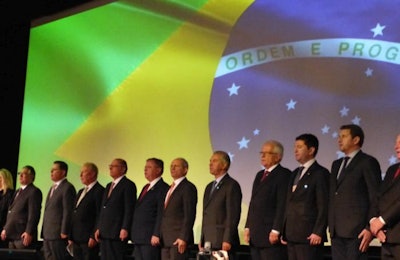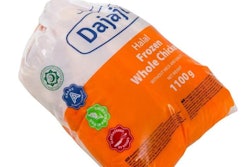
“It is time to start a new Brazil and to leave behind the negative things," were the words with which Francisco Turra, executive president of the Brazilian Association of Animal Protein (ABPA), inaugurated the SIAVS, the International Poultry and Swine Show, on August 29 in São Paulo, Brazil.
The Brazilian poultry and swine industries have put to work its machinery, displaying all the muscle that it is capable of, showing the world that the allegations of Operation Weak Flesh a few months ago were totally unfounded.
In addition to the top executives of the ABPA, seven governors of Brazil's largest poultry producing states, Minister of Agriculture Blairo Maggi and even the Director General of the World Trade Organization (WTO), Brazilian Roberto Azevêdo, were all at the opening ceremony.
Likewise, the exhibition area of the SIAVS grew more than 40 percent when compared to last edition held two years ago. The Image Project, which the ABPA carries together with the Brazilian Government's Export Promotion Agency (APEX), has designed a program with 41 journalists and opinion makers from countries ranging from India to the United Kingdom, passing through several Latin American, African, Asian, and European countries, as well as the United States.
This is a sign that Brazilian animal protein producers and their association are not willing to lose their business. They do want to show the world what they are doing, and what they purport to do is produce high quality protein. As a global producer, they cannot be wrong, at the risk of losing markets. The Brazilian poultry industry has been emphatic: Operation Weak Flesh is not a myth that they want to overturn. It just was not exactly what others said it was.
Ricardo Santin, vice president of the ABPA, said that "no one has sent back Brazilian chicken meat in all of history and that there has never been any problem of expired or spoiled product."
Recovery underway
It is only through truth and transparency that Brazil is managing to recover ground. An example of this can be seen with Japan, a very strict country, which initially banned purchases of Brazilian chicken for two months, but now, not only has it returned to buy Brazilian chicken, but it is importing more.
In 2016, Brazil produced 12.9 million metric tons of chicken meat, making it the second largest producer in the world. In addition, last year Brazil exported 4.38 million metric tons, which represents 30 percent of domestic chicken production. In this way, it is the largest chicken exporter in the world, with sales in more than 150 countries and a 36 percent market share. It should be mentioned that, in the 1960s, Brazil practically did not produce chicken, production has since increased by 1,400 percent.


















